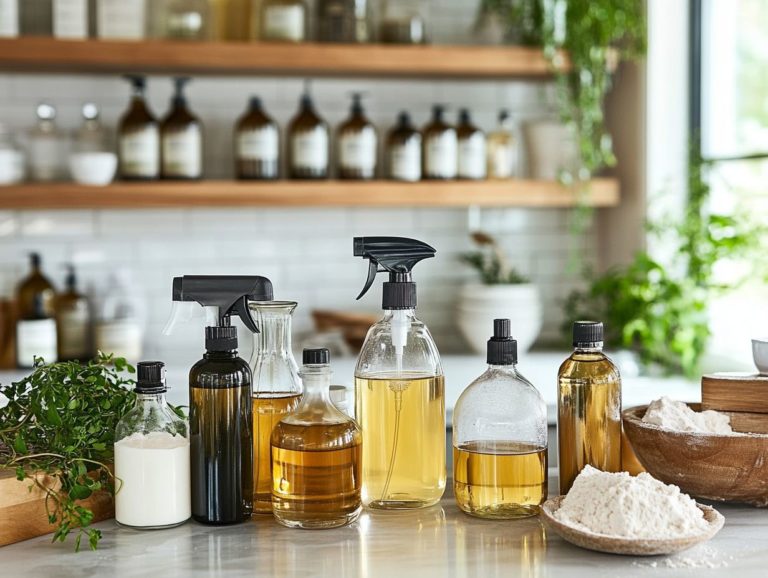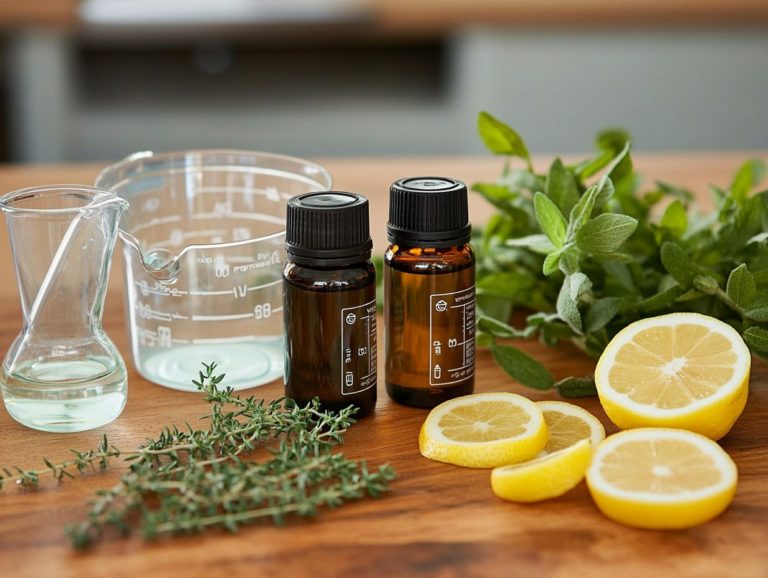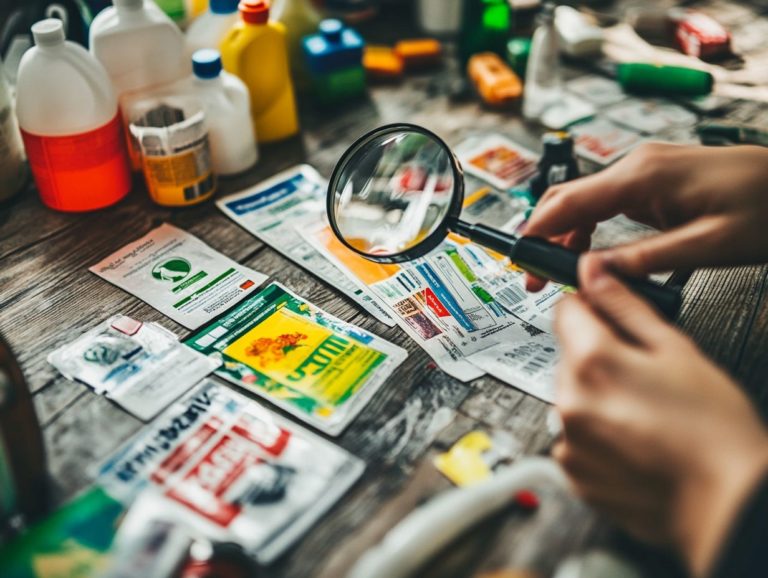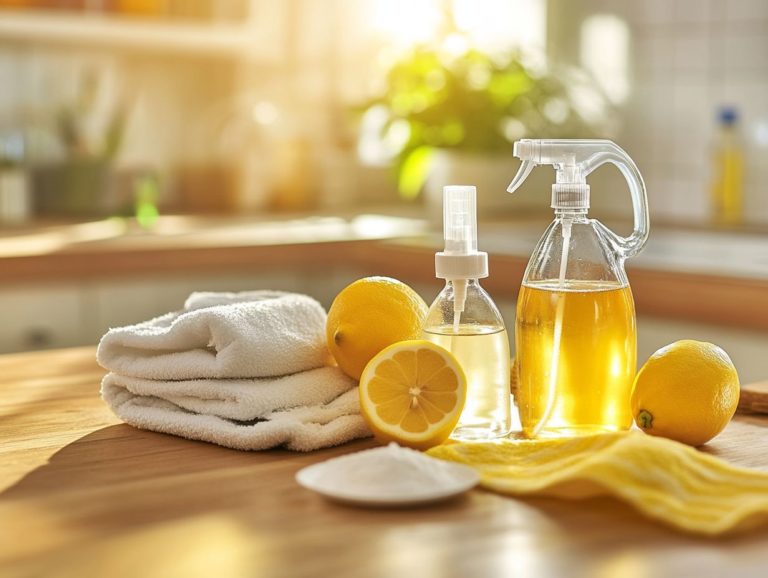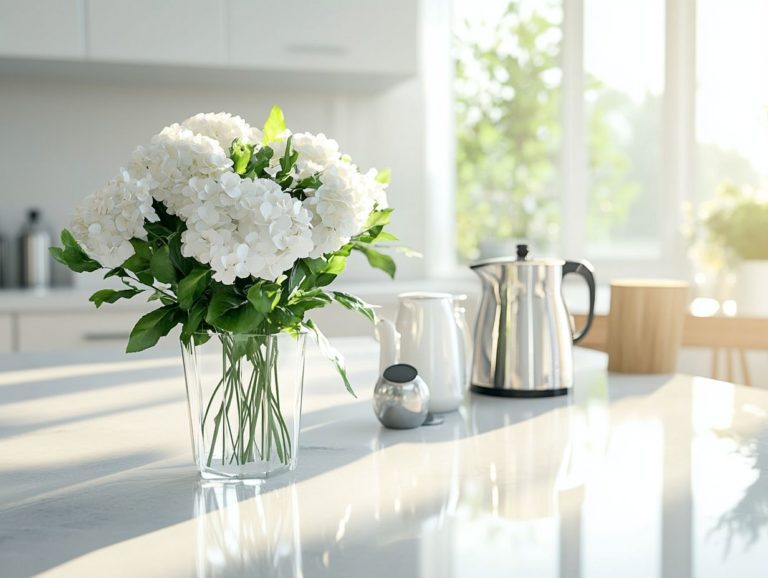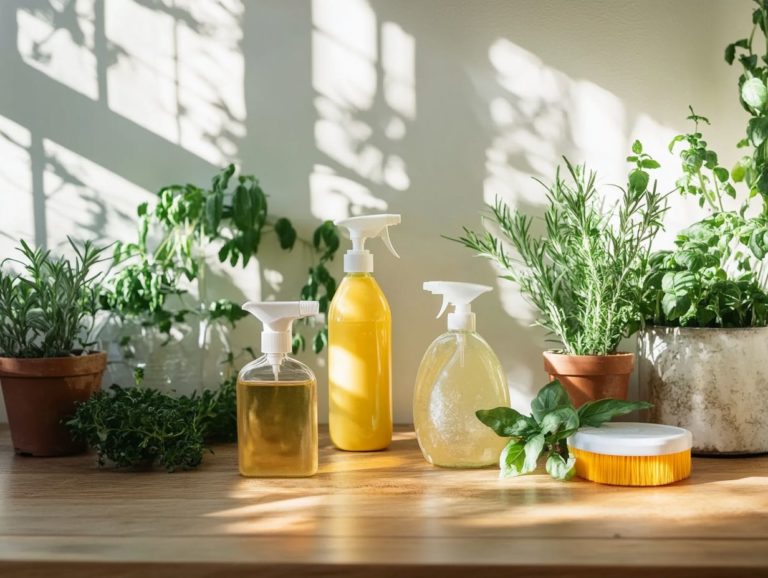What Should I Know About Homemade Cleaner Safety?
In a world increasingly focused on sustainability and health consciousness, you may find that homemade cleaners are becoming a popular choice due to their numerous advantages. Not only are they budget-friendly, but they also offer an environmentally responsible alternative that you can tailor to meet your unique needs.
These cleaners can prevent exposure to harmful chemicals and reduce health problems related to allergies and asthma. With just a few simple ingredients like vinegar, baking soda, soap, and lemon juice, you can whip up effective cleaning solutions right in your own kitchen.
Of course, safety should always be your top priority; understanding how to use these ingredients properly and being aware of any potential risks is crucial. Make sure to label your cleaning supplies correctly and store them safely.
Dive into the exciting world of homemade cleaners! Explore the benefits, key ingredients, and safety guidelines associated with them. Consider some viable alternatives to ensure that you make well-informed decisions for your cleaning routine. Always use caution and proper techniques to ensure your cleaning methods are effective and safe.
Stephanie Sisco from Real Simple recommends using essential oils like lavender and tea tree for their additional health benefits. These oils can help prevent exposure to toxic chemicals found in commercial cleaning products while maintaining a clean and safe household environment.
Contents
- Key Takeaways:
- Why Use Homemade Cleaners?
- What Ingredients Are Used in Homemade Cleaners?
- How Can I Ensure the Safety of Homemade Cleaners?
- What Are Some Alternatives to Homemade Cleaners?
- Frequently Asked Questions
- What Should I Know About Homemade Cleaner Safety?
- Is it safe to mix different homemade cleaners together?
- How do I store homemade cleaners safely?
- Are natural ingredients always safe for homemade cleaners?
- Can homemade cleaners be used on all surfaces?
- How can I make sure my homemade cleaner is effective?
Key Takeaways:
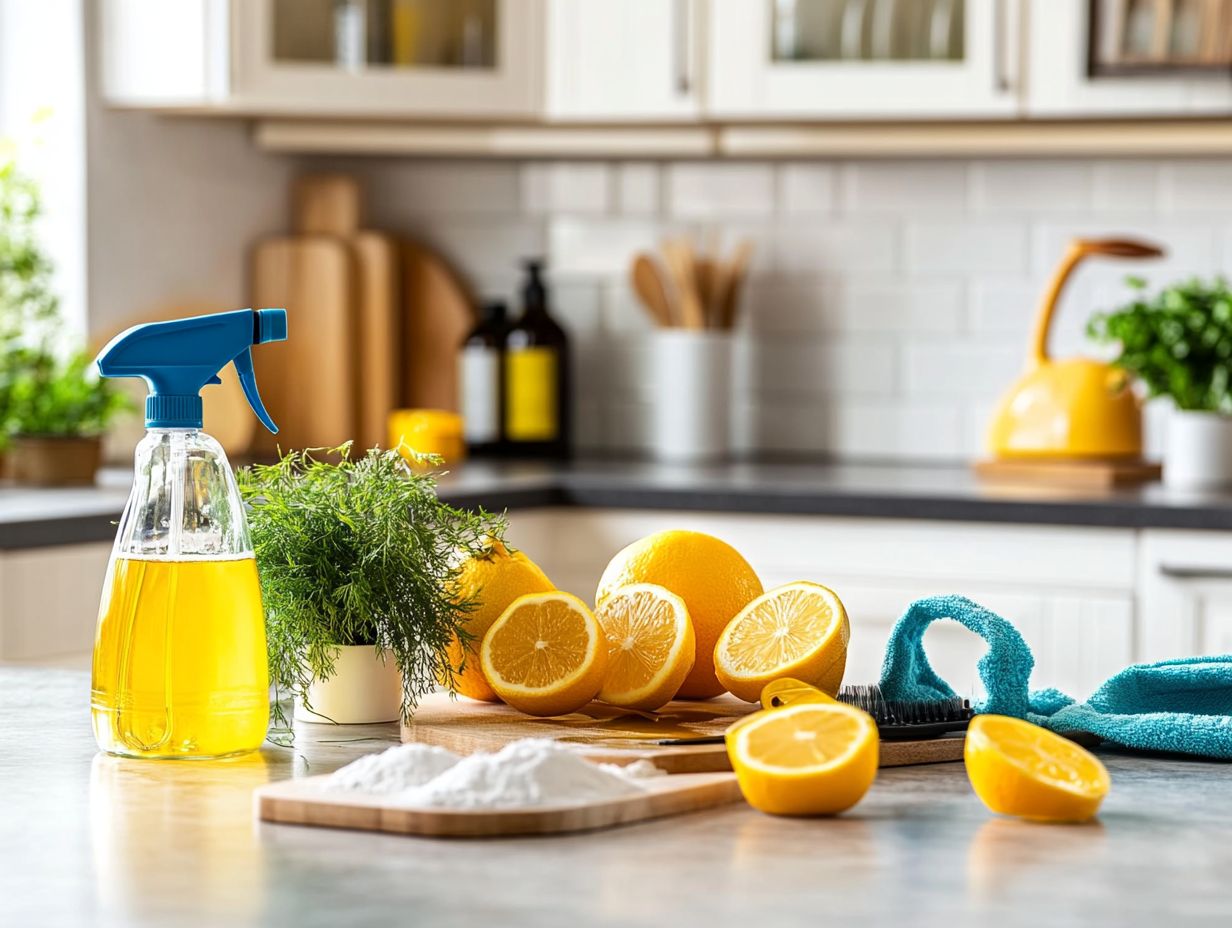
- Homemade cleaners are a cost-effective, environmentally friendly, and customizable option for cleaning. They can reduce exposure to toxic chemicals and prevent respiratory issues.
- Ingredients commonly used in homemade cleaners include vinegar, baking soda, lemon juice, soap, and essential oils.
- To ensure safety, properly dilute ingredients, avoid mixing certain combinations, and use caution when handling essential oils. Label your products clearly and store them out of reach of children and pets.
Why Use Homemade Cleaners?
Homemade cleaners present an excellent option for those looking to create a clean home while emphasizing health, sustainability, and cost efficiency. By leveraging the capabilities of natural ingredients like vinegar, baking soda, and essential oils, you can concoct potent cleaning solutions that not only eliminate germs and odors but are also safer for your children, pets, and household.
With rising concerns about the dangers of toxic cleaning products and the health effects of exposure to volatile organic compounds (VOCs), the allure of eco-friendly alternatives that steer clear of harmful chemicals has never been more compelling. VOCs are harmful chemicals found in many cleaning products that can affect your health. Crafting your own recipes lets you customize your cleaning products to meet your specific household needs, ensuring a spotless environment without sacrificing your health.
1. Cost-effective
One of the standout advantages of using homemade cleaners is their cost-effectiveness, allowing you to save money while maintaining a clean and safe household. These DIY cleaning solutions minimize the need for store-bought products and harmful chemicals.
When you choose DIY cleaning products, you can significantly cut your expenses, as many everyday ingredients like vinegar, baking soda, and lemon juice are not only budget-friendly but also exceptionally effective.
These simple staples can handle a range of cleaning tasks, from cutting through grease to banishing odors, all without the hefty price tag of commercial brands. The financial benefits become even clearer when you consider how much families typically spend on a plethora of store-bought products.
By embracing a more sustainable approach to cleanliness, you not only enhance your budget but also foster a healthier home environment, free from harsh chemicals and pollutants.
2. Environmentally Friendly
Homemade cleaners present a refined, environmentally conscious alternative to conventional cleaning products, often harnessing natural ingredients that are gentler on both your health and the planet. These cleaners are particularly effective in reducing exposure to toxic chemicals and preventing health problems.
By selecting DIY cleaning solutions, you not only foster a healthier home environment but also significantly diminish the presence of harmful toxins and volatile organic compounds (VOCs) commonly found in many commercial cleaners. These synthetic additives can negatively impact indoor air quality and your overall well-being. In contrast, cleaners crafted from eco-friendly ingredients like vinegar, baking soda, and essential oils are not only safe but also remarkably effective.
Opting for products that are EWG VERIFIED ensures that the ingredients adhere to rigorous safety standards, aligning seamlessly with your commitment to sustainability and wellness in your daily cleaning routine. This choice can drastically reduce your family’s exposure to harmful chemicals and improve overall health.
3. Customizable
One of the standout benefits of homemade cleaners is their customizable nature, allowing you to tweak recipes to meet your specific cleaning needs and preferences. This customization can make your cleaning solutions safer and more enjoyable to use.
This level of personalization enables you to tackle a variety of surfaces, from your kitchen countertops to the tiles in your bathroom, ensuring that your chosen cleaner delivers optimal efficacy without causing any damage. When confronted with unique odors or stubborn stains, you have the perfect opportunity to get creative with your ingredient blends. For instance, you might combine vinegar with essential oils to create a fragrant cleaner that s not only effective but also a delight for your senses.
By experimenting with different combinations, you can uncover recipes that perfectly suit your environment, transforming routine cleaning into an enjoyable and satisfying experience. You can also use natural fragrances to enhance the sensory experience of cleaning.
What Ingredients Are Used in Homemade Cleaners?
Homemade cleaners typically combine a range of ingredients that not only excel in cleaning but also prioritize your health and the environment. They help reduce the risk of exposure to harmful chemicals and pollutants.
Among the most commonly used ingredients is vinegar, a remarkable natural disinfectant that packs a powerful punch against germs. Baking soda, with its exceptional deodorizing properties, is another staple you ll want in your cleaning arsenal. Essential oils elevate your cleaning experience, offering delightful fragrances along with antimicrobial benefits. Soap is also essential for breaking down grease. And let s not forget about lemon juice, a favorite for its fresh scent and ability to boost cleaning efficacy.
By familiarizing yourself with the unique properties of these ingredients, you can craft effective cleaning solutions that cater to various household needs with ease and confidence.
1. Vinegar
Vinegar is a powerful and versatile cleaning agent that serves as a natural disinfectant while effortlessly breaking down grime and odors throughout your home.
This household gem excels on various surfaces, particularly countertops, bathroom tiles, and glass. For a straightforward glass cleaner, simply mix equal parts of vinegar and water in a spray bottle; the result will be streak-free, sparkling windows. When faced with stubborn stains on kitchen countertops or cutting boards, a paste made from baking soda and vinegar can be your go-to solution for lifting dirt with ease. Always rinse thoroughly to prevent buildup.
In your laundry routine, vinegar can neutralize odors and soften fabrics, making it an essential cleaning companion. By discovering the right recipes and techniques for different surfaces, you can transform vinegar into an invaluable asset in your cleaning arsenal. Also, consider using fabric labels to keep track of the right mixtures for different fabrics.
2. Baking Soda
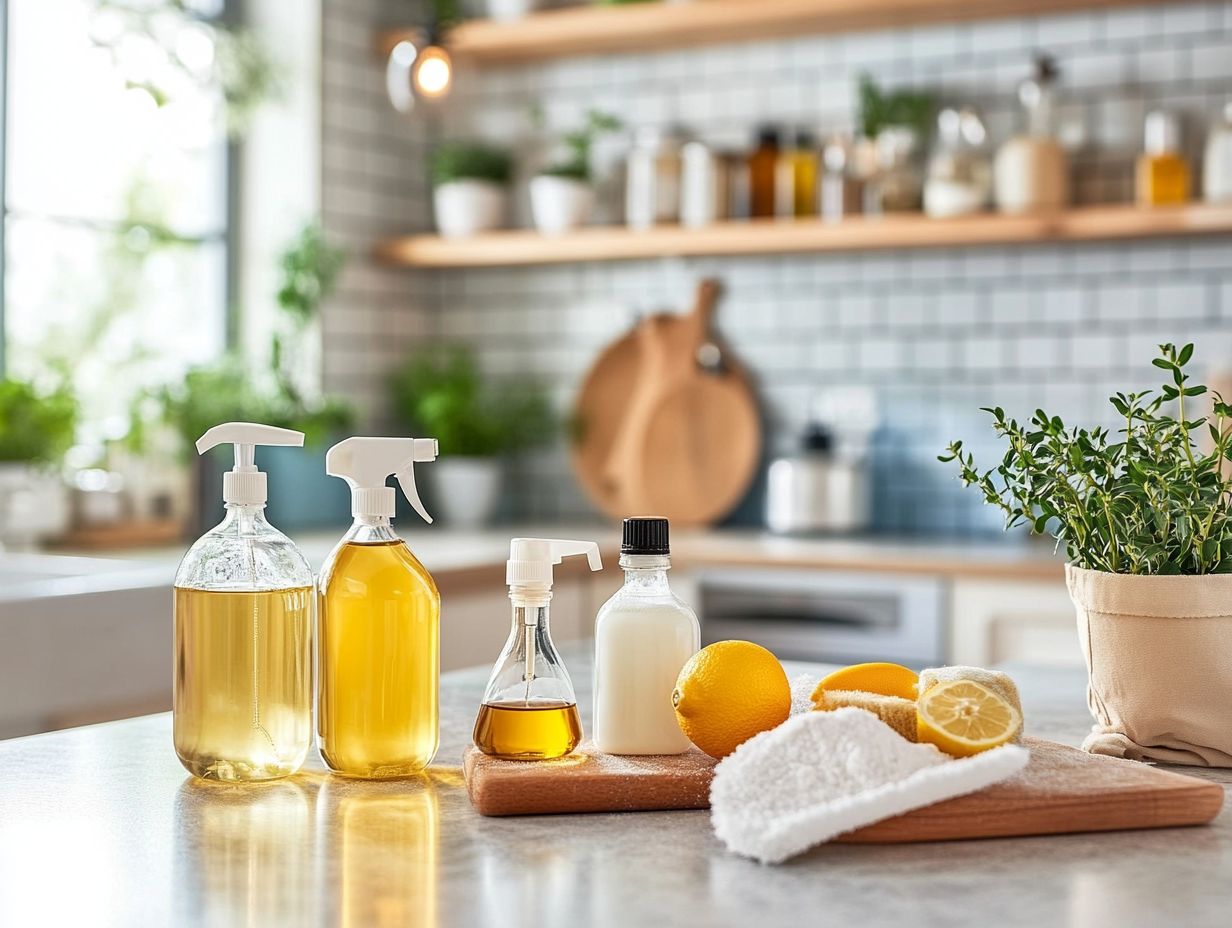
Baking soda is a must-have in your arsenal of homemade cleaners. It is celebrated for its deodorizing capabilities and gentle abrasiveness, making it perfect for a variety of cleaning tasks.
Its versatility allows you to conquer everything from stubborn stains on your countertops to freshening up your carpets. When you mix baking soda with white vinegar, you create a potent yet eco-friendly cleaner that can effortlessly dissolve grime in sinks and bathrooms.
Always store your mixed cleaning solutions in properly labeled containers to ensure safety. You can even whip up a simple paste of baking soda and water to tackle tough stains on your fabric and upholstery.
A generous sprinkle on your carpets can effectively neutralize odors. This budget-friendly alternative showcases just how easily you can harness the power of nature for cleaning, ensuring a fresher environment without the need for harsh chemicals or chlorine bleach.
3. Lemon Juice
Lemon juice is a natural powerhouse in the cleaning world, known for its germ-fighting abilities and remarkable ability to tackle stains, leaving your surfaces fresh and pristine.
Thanks to its high acidity, lemon juice effortlessly breaks down tough grime and neutralizes unpleasant odors. This makes it a perfect fit for an array of homemade cleaning recipes.
When mixed with baking soda, it creates a potent paste that can easily lift stains from countertops and cutting boards. This combination is particularly effective in the kitchen and bathroom.
Diluting lemon juice in water gives you a refreshing and safe cleaner for your windows and mirrors, guaranteeing a streak-free shine every time. Its delightful citrus scent not only elevates your cleaning experience but also helps eliminate lingering odors from kitchens and bathrooms.
By incorporating lemon juice into your cleaning routine, you embrace a natural approach that delivers impressive results. Martha Robinson from Better Homes & Gardens recommends using lemon juice for its natural effectiveness.
4. Essential Oils
Essential oils do more than just infuse your homemade cleaners with delightful fragrances; they also bring germ-fighting abilities that significantly boost their cleaning prowess.
These natural oils, derived from plants, deliver a refreshing scent that can elevate your mood while tidying up. They also act as effective warriors against pesky household germs and bacteria.
For example, tea tree oil is celebrated for its formidable antimicrobial qualities, making it an ideal choice for disinfecting surfaces. Likewise, lavender oil offers a calming aroma and boasts antibacterial properties, making it perfect for crafting a soothing cleaning blend.
Using essential oils also helps prevent the spread of harmful germs and ensures a safer home environment. Incorporating these essential oils into your homemade cleaning solutions is a breeze. Simply mix a few drops with vinegar or baking soda to create an all-purpose cleaner that not only smells fantastic but also assures you of your home s sanitation.
Carolyn Forte from Good Housekeeping highlights the effectiveness of essential oils in making your cleaning routine more enjoyable.
Are Homemade Cleaners Safe?
When contemplating the safety of homemade cleaners, it s essential to recognize that while many natural ingredients are inherently safe, the proper dilution and usage are paramount in preventing potential health concerns, particularly for individuals with allergies or asthma.
It s also critical to ensure that essential oils are employed correctly, as mishandling them can lead to skin irritation or respiratory issues. Just like with any cleaning product, exercising caution and adhering to guidelines will significantly contribute to maintaining a safe cleaning environment for you and those around you.
Ready to start cleaning naturally? Gather these ingredients and make your first homemade cleaner today!
1. Proper Dilution is Key
Properly diluting your homemade cleaners is crucial for safety and effectiveness. Overly concentrated mixtures can pose health risks.
Achieving the right concentrations enhances the performance of your homemade solutions. It also safeguards you from potential dangers associated with harsh ingredients.
For instance, a cleaner designed to tackle tough stains requires specific dilution to unlock its full strength without risking damage to surfaces or causing irritation to your skin and eyes.
It is essential to adhere to recommended ratios based on the task at hand whether disinfecting kitchen surfaces or tackling grime in the bathroom. Understanding the balance between dilution and strength helps you make informed cleaning choices.
2. Avoid Mixing Certain Ingredients
When crafting your homemade cleaners, steer clear of mixing certain ingredients that could trigger toxic reactions. This ensures both your safety and that of your environment.
For example, combining vinegar and baking soda creates a vigorous reaction that releases carbon dioxide gas. This can create pressure if trapped in a closed container.
Mixing bleach with ammonia releases chloramine vapors, a harmful gas that can irritate your lungs and pose serious health risks.
Also, avoid combining hydrogen peroxide with vinegar to prevent dangerous reactions that can form corrosive substances. By being mindful of these combinations, you can maintain a safer cleaning routine.
3. Use Caution with Essential Oils
Essential oils can significantly enhance your homemade cleaners, but it’s crucial to proceed with caution. These delightful scents can trigger allergies or respiratory issues in sensitive individuals.
Always dilute essential oils before applying them. Typically, this involves mixing them with a carrier oil like jojoba or coconut to reduce their concentration and minimize irritation risks.
Performing a patch test before widespread use is wise. This allows you to identify any potential allergic reactions early on.
Keep in mind that certain oils may affect children and pets differently, so be particularly cautious in those situations.
Incorporating essential oils can enhance your cleaning routine, but do so with a cautious and informed approach to create a safe and healthy environment.
How Can I Ensure the Safety of Homemade Cleaners?
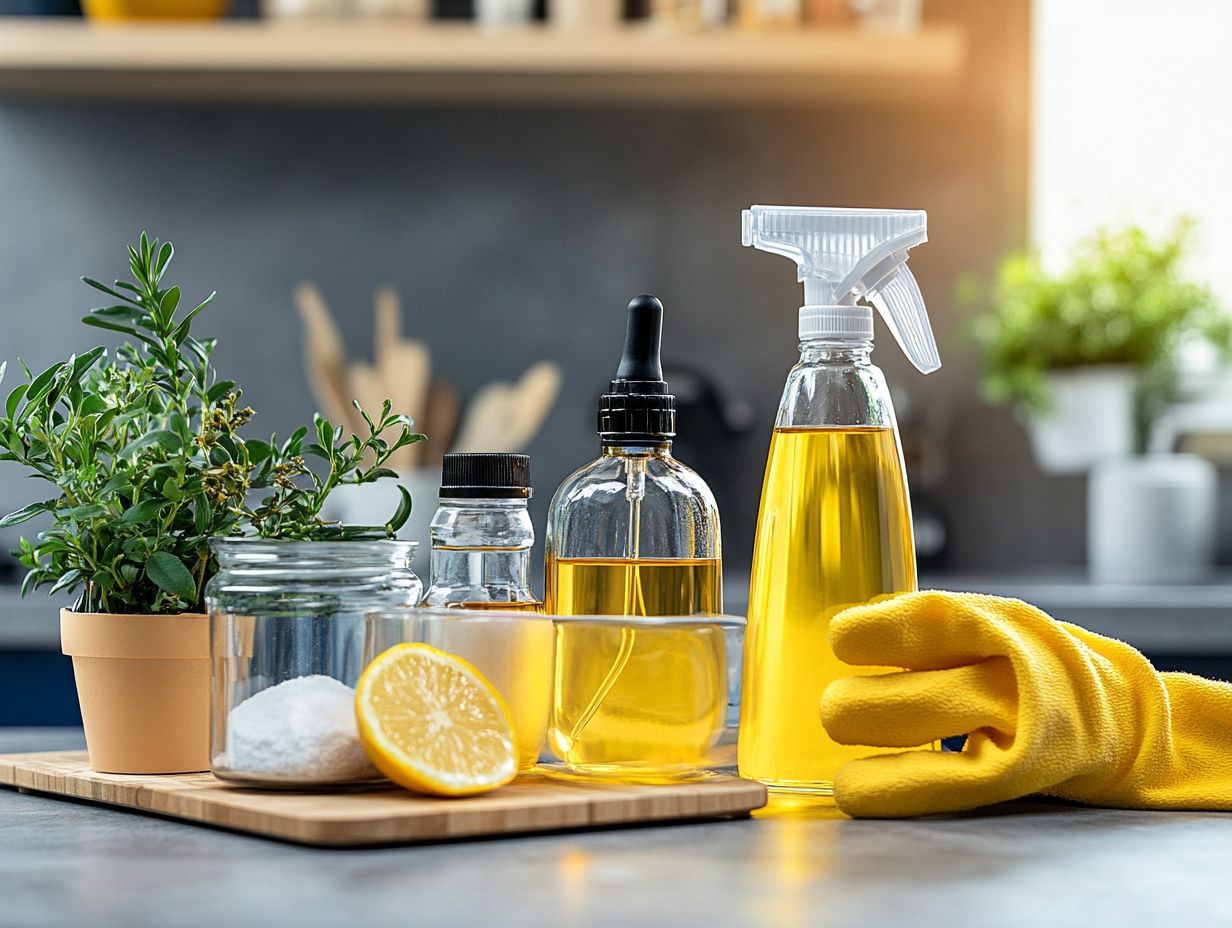
To ensure the safety of your homemade cleaners, adopt a few key practices. Start by thoroughly researching and meticulously following recipes.
Clearly labeling your containers enhances clarity and prevents mix-ups. Proper storage avoids accidental misuse and keeps your cleaning solutions out of reach of unintended users.
When working with concentrated ingredients, use protective gear to shield yourself from potential exposure. Embracing these straightforward measures allows you to enjoy the benefits of homemade cleaning solutions while prioritizing your health and safety.
1. Research and Follow Recipes Carefully
Thorough research and meticulous adherence to recipes are essential when crafting homemade cleaners. This ensures both safety and effectiveness in your cleaning endeavors.
This diligence guarantees that your final products are powerful in combating dirt and safe for those you care about, including family members and pets.
To uncover reliable information, seek out established websites managed by reputable health organizations or trusted cleaning experts. User reviews can offer valuable insights into others’ experiences with specific formulations.
Verifying the scientific backing behind ingredients can boost your confidence in the safety and efficacy of your chosen recipes. By prioritizing trustworthy sources, you significantly reduce the risk of incorporating harmful substances, ultimately contributing to a healthier living environment.
2. Label and Store Properly
Properly labeling and storing your homemade cleaners is essential for maintaining safety and clarity. This practice helps you easily identify the contents and prevents any accidental misuse.
If you’re crafting your own cleaning solutions, prioritizing these practices is key to ensuring a safe home environment. Using clear containers makes it easy to spot what’s inside, so you can grab your cleaner without delay! It s equally important to include detailed ingredient information on each label; this helps you understand any potential allergens or harmful components.
By implementing these best practices, such as keeping cleaners out of reach of children and clearly labeling the contents, you can enjoy peace of mind while effectively managing household cleanliness.
3. Use Protective Gear When Necessary
Using protective gear when necessary is an essential step in ensuring your safety while working with homemade cleaners. This is particularly important when you’re handling concentrated ingredients that could lead to irritation or health issues.
This becomes especially critical when you might be exposed to strong acids or bases, which can wreak havoc on surfaces and pose serious health risks if they come into contact with your skin or are inhaled.
Common types of protective gear include:
- gloves
- goggles
- masks
These items are designed to mitigate the risks associated with chemical exposure. For instance, wearing gloves shields your skin from irritation, and goggles protect your eyes from splashes. Wearing a mask is essential to protect yourself from harmful vapors.
By taking these precautions, you’ll dramatically boost your safety while enjoying your DIY cleaning projects.
What Are Some Alternatives to Homemade Cleaners?
While homemade cleaners offer numerous advantages, you have a world of alternatives at your fingertips. Consider exploring options such as natural store-bought cleaners, eco-friendly cleaning services, and professional cleaning products that emphasize safety and minimize environmental impact.
1. Natural Store-bought Cleaners
Natural store-bought cleaners present an effective and safe alternative to homemade solutions. They often boast certifications like EWG VERIFIED, a label that shows products meet environmental safety standards, to reassure you of their eco-friendly ingredients.
These products not only meet high safety standards but also tackle dirt, stains, and odors effectively without harsh chemicals. Many consumers appreciate the ability to maintain a pristine home environment while prioritizing their health and that of their loved ones. The eco-friendly aspect of these cleaners benefits your space and positively impacts the planet by reducing harmful pollutants.
Opting for certified natural cleaners means choosing products that undergo rigorous testing, ensuring you enjoy outstanding performance alongside a strong commitment to sustainability.
2. Green Cleaning Services
Green cleaning services present a refined and eco-friendly alternative to the DIY approach. They ensure your home is cleaned safely while promoting eco-friendly methods.
These services bring expert cleaners to your home, using techniques that are safe for you and the environment. Their trained staff is well-versed in the most effective cleaning techniques that avoid harmful chemicals. By utilizing eco-friendly products, they not only safeguard your immediate environment but also play a significant role in fostering a healthier planet.
This commitment ensures safety for everyone in your home, especially children and pets, who are particularly sensitive to harsh chemicals. By choosing these services, you can significantly reduce allergens and toxic exposure, granting you peace of mind while maintaining a pristine and inviting living space.
Explore these options today to create a safer, cleaner home for you and your family!
3. Professional Cleaning Products
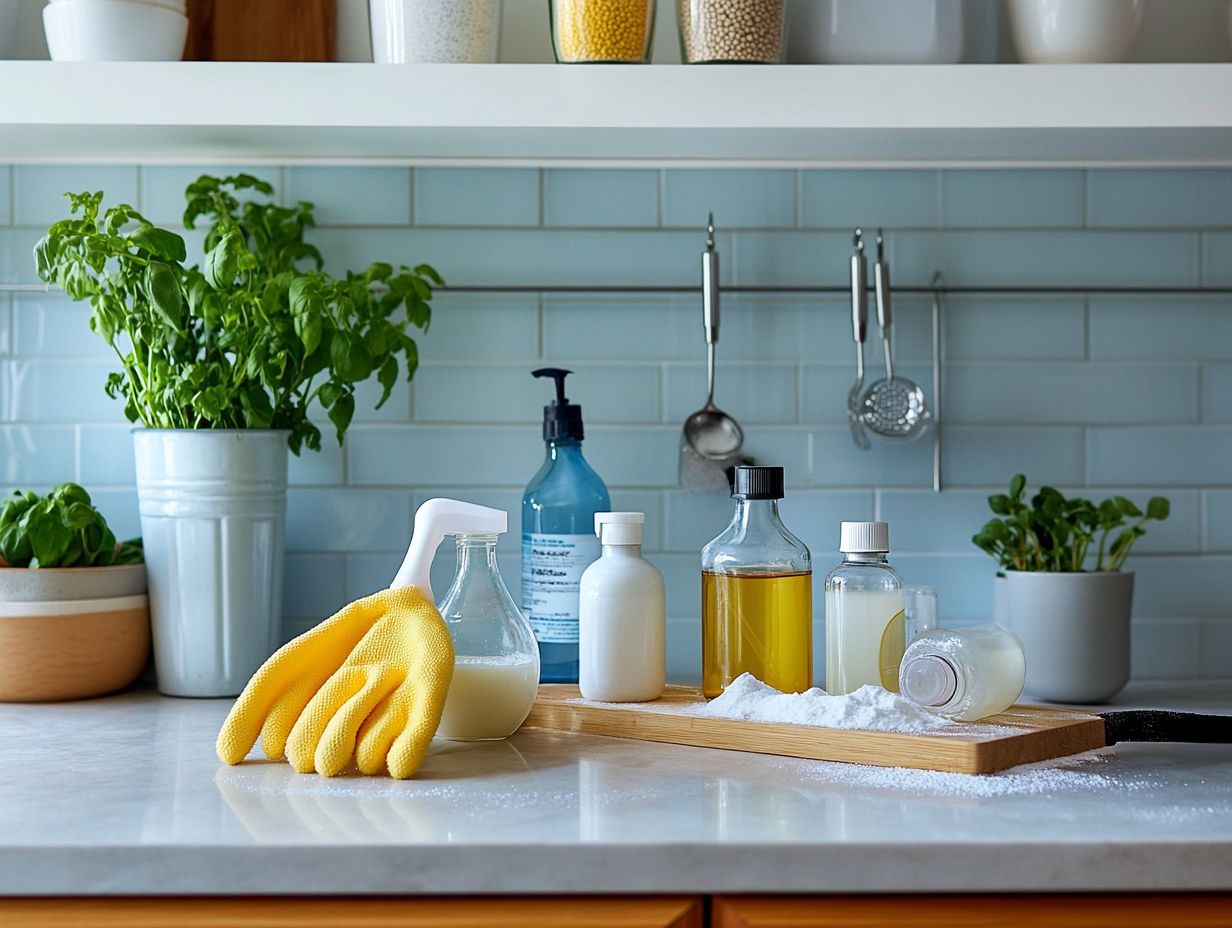
Professional cleaning products are made to be effective and safe. They are rigorously tested to tackle even the toughest cleaning challenges while considering health implications.
These products feature advanced formulations, making them adept at handling a variety of surfaces. Whether you re confronting grease stains on kitchen countertops or allergen buildup in fabrics, they rise to the occasion.
Users often find themselves appreciating the cleaning power these solutions deliver, along with the reassurance that comes with knowing they have undergone thorough safety evaluations.
These products minimize environmental impact while maximizing efficiency. It s exciting to see how they balance performance and eco-friendliness, appealing to people who care about the environment. This commitment makes professional cleaning products an enticing choice for anyone seeking to maintain a pristine home.
Frequently Asked Questions
What Should I Know About Homemade Cleaner Safety?
Homemade cleaners can be a safe and effective alternative to store-bought products, but it’s important to keep a few things in mind to ensure their safety.
Is it safe to mix different homemade cleaners together?
No, it is not safe to mix different homemade cleaners together. The combination of certain ingredients can create harmful fumes or even cause explosions. Stick to using one recipe at a time.
How do I store homemade cleaners safely?
Homemade cleaners should be stored in airtight containers, preferably labeled with the ingredients and instructions. Keep them out of reach of children and pets.
Are natural ingredients always safe for homemade cleaners?
Not all natural ingredients are safe for homemade cleaners. Some can cause skin irritation or be toxic when ingested. Always research and properly handle any ingredients before using them in a cleaner.
Can homemade cleaners be used on all surfaces?
No, not all homemade cleaners are safe for all surfaces. Some ingredients may damage certain materials, so it’s important to test a small area first before using the cleaner on a larger surface.
How can I make sure my homemade cleaner is effective?
To ensure your homemade cleaner is effective, follow a trusted recipe and make sure to use the correct measurements for each ingredient. Also, be sure to properly clean and disinfect any tools or containers used for making the cleaner.

